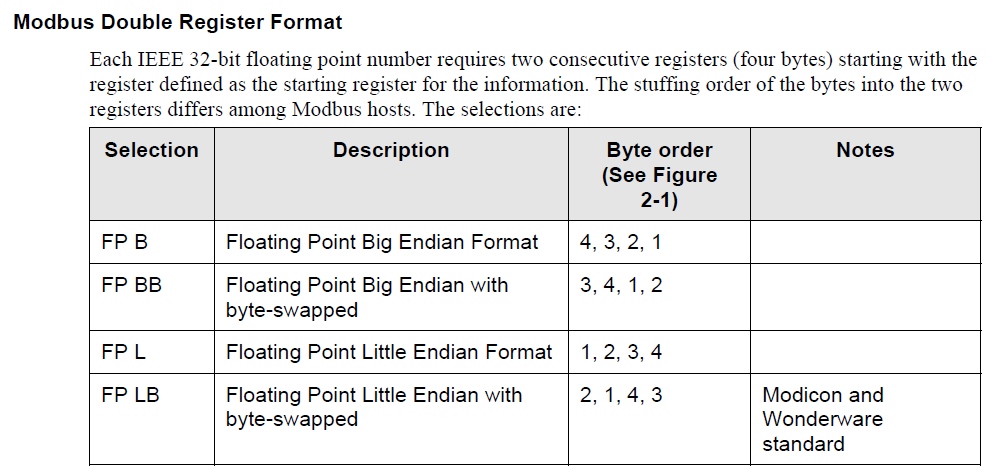Peter Nachtwey
Member
While I am now retired, I still visit Delta a few times a week.
I saw an intern trying to write code to interface a Delta RMC motion controller with an ABB PLC using Modbud TCP. It wasn't working because the byte order was incorrect. The problem is that there is no specification for how 32 bit numbers should be transferred between devices. It seems that every one chooses what every byte order pleases them. A thousand curses on Modicon for not specifying a 32 bit standard/byte order.
Delta did what I think is obvious. I/we bought a Modicon PLC and figured out the byte order that a Modicon PLC requires to transfer 32 bit values. We think of this as being the unwritten specification for transferring 32 bit values. Delta motion controller have no problems communicating with Modican/Schnider PLCs.
However, many PLC manufacturers do what they want and still say they support Modicon/TCP when they can't really communicate with a Modicon PLC with 32 bit values.
So recently I went to Delta and I saw an intern ( noob of life ) trying to interface a Delta motion controller with an ABB controller. The noob was having no luck because the ABB PLC claimed to support Modbus/TCP but actually was not compatible at a 32 bit level. This is a HUGE problem. The noob, intern, was trying many things to make the communications work. I can see that it an wasted effort.
I do not like Modbus RTU or Modbus TCP/IP for many reason but mostly because of the specifications or people's unwillingness to support the specifications that do exits.
A thousand curses on them because they make our life much harder when our customers ask why it doesn't work.
Years ago I had the same rant with Siemens S7 plcs. Siemens finally fixed the problem with Profinet and the S7-1200 and S7-1500. However the S7-300s were always a pain to support. It wouldn't have been bad if the Siemens peoples could support them but they were always clueless or said it was a third party problem ( our problem ). Fortunately this problem has gone away.
However, now were are having problems with PLC companies that clam to support Modbus TCP/IP even though that can't communicate with a Modicon PLC using 32 bit values.
I saw an intern trying to write code to interface a Delta RMC motion controller with an ABB PLC using Modbud TCP. It wasn't working because the byte order was incorrect. The problem is that there is no specification for how 32 bit numbers should be transferred between devices. It seems that every one chooses what every byte order pleases them. A thousand curses on Modicon for not specifying a 32 bit standard/byte order.
Delta did what I think is obvious. I/we bought a Modicon PLC and figured out the byte order that a Modicon PLC requires to transfer 32 bit values. We think of this as being the unwritten specification for transferring 32 bit values. Delta motion controller have no problems communicating with Modican/Schnider PLCs.
However, many PLC manufacturers do what they want and still say they support Modicon/TCP when they can't really communicate with a Modicon PLC with 32 bit values.
So recently I went to Delta and I saw an intern ( noob of life ) trying to interface a Delta motion controller with an ABB controller. The noob was having no luck because the ABB PLC claimed to support Modbus/TCP but actually was not compatible at a 32 bit level. This is a HUGE problem. The noob, intern, was trying many things to make the communications work. I can see that it an wasted effort.
I do not like Modbus RTU or Modbus TCP/IP for many reason but mostly because of the specifications or people's unwillingness to support the specifications that do exits.
A thousand curses on them because they make our life much harder when our customers ask why it doesn't work.
Years ago I had the same rant with Siemens S7 plcs. Siemens finally fixed the problem with Profinet and the S7-1200 and S7-1500. However the S7-300s were always a pain to support. It wouldn't have been bad if the Siemens peoples could support them but they were always clueless or said it was a third party problem ( our problem ). Fortunately this problem has gone away.
However, now were are having problems with PLC companies that clam to support Modbus TCP/IP even though that can't communicate with a Modicon PLC using 32 bit values.








